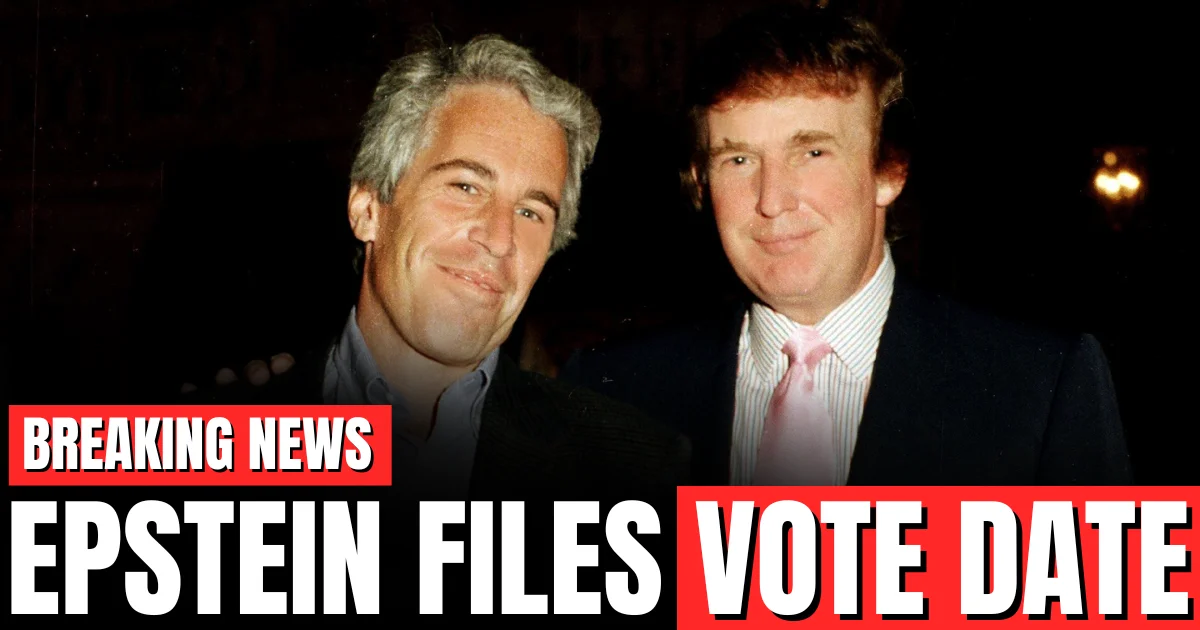Congressional vote on Epstein documents approaches as Trump reverses position. Timeline, political implications, and what files could reveal explained.
Table of Contents
Epstein Files Congressional Vote Approaches as Trump Reverses Stance on Document Release
Congress prepares to vote on releasing sealed documents related to the Jeffrey Epstein case, while former President Donald Trump publicly shifts his position on disclosure. This developing story raises questions about government transparency and political accountability.
The anticipated vote could determine whether thousands of pages remain confidential or become public record. Trump’s evolving stance adds political complexity to an already contentious debate about document disclosure.
Timeline for Congressional Vote
Congressional leaders have scheduled discussions regarding Epstein-related document release for upcoming legislative sessions. Multiple proposals circulate about which materials should become publicly accessible.
Specific vote timing remains fluid as lawmakers negotiate terms and scope. Committee hearings will likely precede any floor votes on document disclosure measures.
Key timeline elements:
- Committee review sessions scheduled for coming weeks
- Full congressional vote expected within next legislative period
- Bipartisan support exists for some transparency measures
- Disagreements persist about scope and redaction levels
- Presidential input could influence final legislation
The legislative process involves multiple steps before any documents become publicly available. Even after voting, release procedures and redaction reviews require additional time.
What Documents Are Under Discussion
The sealed materials include court records, investigative files, and various legal documents from Epstein-related proceedings. These records accumulated through criminal investigations, civil lawsuits, and related legal actions.
Federal courts previously sealed portions of these materials citing privacy concerns and ongoing investigations. Some documents were made public in previous years while others remain confidential.
Categories of documents potentially affected:
Court Filings and Testimony
Depositions, witness statements, and legal arguments from various cases involving Epstein and associated individuals. These materials contain allegations, testimonies, and legal claims from multiple parties.
Flight Logs and Travel Records
Documentation of private aircraft usage and passenger manifests. These records show who traveled on Epstein’s planes and when those trips occurred.
Financial Records
Banking transactions, property records, and business dealings that investigators examined. Financial documentation could reveal business relationships and money flows.
Investigative Materials
Law enforcement reports, FBI documents, and prosecutor files developed during criminal investigations. These materials contain evidence gathered and investigative conclusions.
Contact Lists and Communications
Address books, phone records, and correspondence that investigators collected. These documents potentially identify individuals with various connections to Epstein.
Trump’s Shifting Position Explained
Former President Trump recently stated support for releasing Epstein-related documents, marking a departure from previous positions. During his prior administration, certain materials remained classified or sealed.
Trump now argues that full transparency serves the public interest. His public statements emphasize that “people deserve to know the truth” about Epstein connections.
Factors possibly influencing Trump’s position change:
Political Positioning
As a presidential candidate, Trump may seek to demonstrate transparency credentials. Supporting document release could counter accusations about concealing information.
Deflection Strategy
Some political analysts suggest Trump aims to shift focus toward political opponents potentially named in documents. Public disclosure could create problems for rivals while Trump claims innocence.
Confidence in Content
Trump’s support for release might indicate confidence that documents contain nothing damaging to him personally. He has previously denied wrongdoing and distanced himself from Epstein.
Pressure from Supporters
Conservative activists and conspiracy theory communities have long demanded Epstein document disclosure. Trump may respond to pressure from his political base.
Changed Political Landscape
Outside the White House, Trump faces different political calculations. Document release now carries different risks and benefits than during his presidency.
Political Implications and Reactions
The Epstein files debate creates unusual political dynamics with members of both parties expressing transparency concerns. However, disagreements exist about appropriate disclosure levels.
Some lawmakers argue complete transparency is essential for public trust. Others warn that unrestricted release could violate innocent people’s privacy or compromise ongoing investigations.
Congressional positions vary:
Transparency Advocates
Politicians from both parties support maximum disclosure with minimal redactions. They argue that powerful individuals should not hide behind privacy protections when public interest is significant.
Privacy Protectors
Some legislators warn against publishing unverified allegations that could harm reputations unfairly. They advocate for releasing only proven facts with appropriate privacy protections.
Selective Release Supporters
Moderate positions suggest releasing some categories while protecting others. This approach attempts balancing transparency with privacy and security concerns.
The debate reflects broader tensions about government secrecy versus public accountability. Similar controversies surround classified document handling and executive privilege claims.
Legal and Privacy Considerations
Document release involves complex legal questions about privacy rights, defamation risks, and judicial procedures. Courts traditionally balance transparency interests against individual privacy protections.
Many people named in Epstein-related documents were never charged with crimes. Legal experts warn that releasing unproven allegations could constitute unfair reputation damage.
Key legal issues:
Presumption of Innocence
Being mentioned in investigative documents does not prove wrongdoing. Many individuals had legitimate business or social contacts with Epstein before his crimes became public knowledge.
Privacy Rights
Even public figures retain some privacy protections under law. Courts must weigh public interest against individual privacy when considering document releases.
Defamation Concerns
Publishing unverified allegations could expose the government to lawsuits. Victims’ statements in legal proceedings sometimes contain accusations later proven false.
Ongoing Investigations
Some Epstein-related investigations continue. Releasing certain documents could compromise active cases or reveal confidential sources.
National Security
Epstein’s international connections raise questions about whether some documents contain classified information or intelligence sources.
What Previous Releases Revealed
Courts have already unsealed portions of Epstein-related documents in recent years. These prior releases included depositions, legal filings, and some investigative materials.
Previous document releases named various prominent individuals who had contact with Epstein. The disclosures generated substantial media coverage and public discussion.
Patterns from earlier releases:
- Many named individuals were never accused of criminal conduct
- Social and business relationships did not necessarily indicate knowledge of crimes
- Some people immediately distanced themselves after learning of allegations
- Media coverage sometimes conflated association with criminal involvement
- Legal experts emphasized distinction between contact and wrongdoing
These earlier experiences inform current debates about additional releases. Supporters of disclosure argue previous releases served public interest despite controversies.
Public Interest and Accountability Arguments
Transparency advocates contend that Epstein’s connections to powerful people make document release essential for democratic accountability. They argue that influence should not protect anyone from public scrutiny.
The case involves allegations of crimes against minors and potential enablers who escaped accountability. Disclosure supporters believe sunlight serves as the best disinfectant for potential corruption.
Arguments for maximum transparency:
- Public deserves to know how justice system handles powerful individuals
- Potential cover-ups or preferential treatment must be exposed
- Victims’ voices should not be suppressed to protect famous names
- Democratic accountability requires transparency about government actions
- Historical record should be complete and accessible
These arguments resonate with Americans across political spectrums who distrust institutions. Epstein’s case crystallizes concerns about two-tier justice systems favoring elites.
Counterarguments About Responsible Disclosure
Opponents of blanket document release warn about unintended consequences. They argue that responsible transparency requires careful consideration of competing interests.
Publishing every investigative document could establish dangerous precedents. Future witnesses might refuse cooperation if their statements automatically become public.
Concerns about unrestricted release:
- Innocent people named in investigative materials suffer reputation harm
- Unverified allegations treated as facts by media and public
- Victims’ privacy potentially violated by graphic testimony details
- Investigative techniques and sources could be compromised
- Foreign intelligence services gain insights into US legal processes
These counterarguments do not necessarily oppose all disclosure but advocate for thoughtful redaction and phased releases protecting legitimate interests.
Expected Outcomes and Next Steps
Political observers anticipate Congress will approve some form of document release legislation. The exact scope and timeline remain uncertain as negotiations continue.
Bipartisan support exists for increased transparency, though disagreements persist about implementation details. Compromise legislation will likely include privacy protections and redaction procedures.
Possible scenarios:
Comprehensive Release
Congress mandates disclosure of nearly all documents with minimal redactions. This outcome satisfies transparency advocates but raises legal challenges.
Selective Disclosure
Legislation requires releasing specific document categories while protecting others. This compromise attempts balancing competing interests.
Staged Release
Documents become public gradually with review periods between phases. This approach allows assessment of impacts before proceeding further.
Executive Action
Presidents possess authority to declassify certain federal documents. Trump or current administration could act independently of Congress.
Regardless of legislative outcomes, legal challenges will likely follow. Individuals named in documents may seek court intervention to block releases affecting them.
FAQ SECTION
1. When will Congress vote on releasing Epstein files?
Congress has scheduled committee discussions for upcoming weeks, with full floor votes expected within the next legislative session. Specific dates remain flexible as lawmakers negotiate the scope of document releases and appropriate privacy protections. The legislative process involves multiple steps, so even after voting, actual document releases would require additional time for review and redaction procedures.
2. Why did Trump change his position on Epstein document release?
Trump now publicly supports releasing Epstein-related documents after previously maintaining certain files as sealed during his administration. Political analysts cite several possible motivations including demonstrating transparency as a presidential candidate, confidence that documents contain nothing damaging to him personally, responding to pressure from his political base, and potentially deflecting attention toward political opponents who might be named in the files.
3. What information could the Epstein files contain?
The sealed documents include court records, depositions, witness testimonies, flight logs, financial records, investigative reports, and communications collected during various legal proceedings. These materials potentially identify individuals with various connections to Epstein, though being mentioned does not prove wrongdoing. Many people had legitimate business or social contacts before his crimes became publicly known.
4. Will releasing the files violate anyone’s privacy rights?
Legal experts debate balancing transparency with privacy protections. While public interest in accountability is significant, many individuals named in investigative documents were never charged with crimes. Courts traditionally protect people from having unverified allegations made public. Any release legislation will likely include redaction procedures to protect innocent parties while still serving legitimate transparency interests.
5. Have any Epstein documents been released previously?
Yes, courts have unsealed portions of Epstein-related documents in recent years, including depositions, legal filings, and some investigative materials. These prior releases named various prominent individuals with connections to Epstein, though having contact did not necessarily indicate knowledge of or involvement in criminal activity. Previous disclosures inform current debates about additional transparency measures.
CONCLUSION
The approaching congressional vote on Epstein file releases represents a significant moment for government transparency and political accountability. Trump’s reversal on document disclosure adds political intrigue to debates already fraught with legal and ethical complexity.
Whether Congress mandates comprehensive release or adopts more limited disclosure, the decision will impact ongoing discussions about balancing transparency with privacy rights. Americans across the political spectrum share concerns about powerful individuals potentially escaping accountability.
As this story develops, the legislative process will test whether government institutions can satisfy public demands for transparency while protecting legitimate privacy interests. The outcome may establish important precedents for future document disclosure debates.
Should the government release all Epstein-related documents regardless of privacy concerns, or do some materials deserve protection? What level of transparency serves the public interest best? Share your perspective in the comments!

